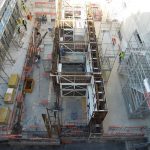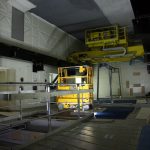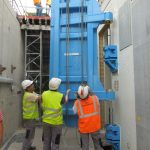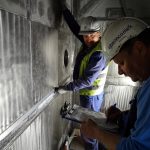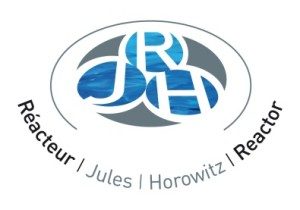 JHR-CZ – website
JHR-CZ – website
Participation of the Czech Republic
Hosting institution: Research Centre Řež
JHR (Jules Horowitz Reactor) will represent a material research reactor of 100 MW thermal power output, designed for R&D and material and nuclear fuel qualification. The reactor will make possible a material testing under conditions corresponding to power reactors, an acceleration of model degradation and an evaluation of component properties at the end of their lifetime. JHR will serve purposes of a wide range of irradiation experiments, such as fuel studies including fuel selection and characterization, testing and evaluation of fuel exposed to conditions corresponding to reactor normal operation or its transients, as well as to incidental and accidental conditions. Additionally, JHR will enable material studies, including studies of fuel cladding corrosion and effects of high dose rates on the cladding and structural materials. The portfolio of JHR expertise and services provided will include also nuclear waste management and medical applications. Related studies will also contribute to enhancement of safety for both existing and future reactors. JHR is being constructed in Cadarache research centre in France under the coordination authority of CEA (Commissariat à l’énergie atomique et aux énergies alternatives) as an international project of research infrastructure with Belgium, Czech Republic, Finland, France, India, Israel, Japan, Spain, Sweden, Great Britain and European Commission participating. JHR-CZ ensures the contribution of the Czech Republic to JHR by participating at JHR construction by a supply of hot cells. Due to this contribution, the Czech Republic will have an access to 3 % of the JHR research measuring capacity once the reactor will be put into operation. Consequently, JHR-CZ will be in charge of ensuring access of the Czech research community to JHR capacities. At the same time, the LVR-15 research reactor, operated by Research Centre Řež, has a high potential to become a part of the regional research infrastructure associated with JHR. Thus, some of the scheduled experiments could be prepared, on a smaller scale, in LVR-15 reactor, before being conducted in JHR.
Future development
The JHR construction will continue until 2021, while the hot cell unit installation should be completed in 2019. After a civil work completion, an installation of JHR technologies and equipment will proceed. A commencement of JHR, which operation is planned at least for 50 years, is scheduled for 2021. After termination of its operation, a phase of JHR decommissioning is planned for the following 22 years, with the hot cells also used during this process. Reliability and safety of the hot cells supplied by the Czech Republic must be ensured, therefore, for the minimum period of 72 years.
Socio-economic impact
Most of the research reactors currently operated in the EU will be gradually removed from operation after the year 2020, due to their obsoleteness. Similarly, a gradual activity diminution of LVR-15 and LR-0 Czech research reactors is envisaged. Thus, after 2030 JHR will become a unique material research reactor in Europe. JHR will be beneficial for sectors of both conventional and nuclear power industry in the areas of material and fuel qualification, as well as for medicine and research of short-term radioisotopes used for diagnostic or therapeutic purposes, and also for advanced methods in semi-conductor industry, such as Neutron Transmutation Doping. JHR will make possible a cooperation of nuclear regulatory bodies and nuclear facility operators from Bulgaria, Czech Republic, Finland, Hungary, Russia, Slovakia and Ukraine in context of subjects related to VVER type reactors (Water Water Energetic Reactor) and coordination of the optimal use of shared research capacities for VVER community in Central and Eastern Europe. Many industrial companies from the Czech Republic (ČEZ, Doosan, MEGA, a.s., Škoda jaderné strojírenství, Škoda Power, ÚJV Řež, a.s.) also belong among potential users of the JHR capacity. The Czech participation in JHR brings positive effects on the Czech industry at the time of the JHR construction, already, due to the cooperation in the hot cells design and construction.
